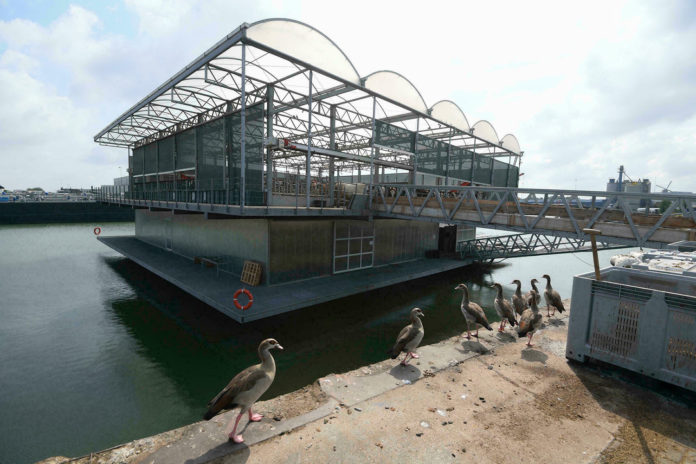The Netherlands is one of the largest emitters of greenhouse gases per capita in Europe. It faces a major problem with agricultural emissions, particularly in the dairy sector, which produces large amounts of methane from cows. A third of the country’s territory lies below sea level, rising waters caused by climate change threaten the densely populated nation resulting in a desperate need for the country’s residents to curb their emissions and find more space for farms.
A Dutch couple, Peter and Minke van Wingerden, is developing a floating cow farm model as a way to adapt to climate change. In the port city of Rotterdam, where land is scarce, and climate change is a daily threat, a three-story cow farm with a combined steel and glass structure is being built above the water.
The cow farm floats on the water, which means it can adjust to rising sea levels and doesn’t need to take up any space on land. The cows live on the top floor, while their milk is processed into cheese, yogurt, and butter in the middle layer, and the cheese is matured in the bottom layer.
“We are on the water, so the farm moves with the tide – we rise and fall up to two meters. So in case of flooding, we can continue to produce,” said Minke van Wingerden, 60, who runs the farm with her husband Peter.
The health and nutrition of cows on farms are closely monitored. The farm’s cows are fed on a mixture of food, including grapes from a food bank, grain from a local brewery, and grass from local golf courses. They thus forgo the emissions that would have to be created for the production of their food.
Furthermore, the cows’ manure is turned into garden pellets – a process that helps further cut emissions by reducing methane – and their urine is purified and recycled into drinking water for the cows. In addition, the farm is equipped with dozens of solar panels that produce enough electricity for the farm’s needs.
“The world is under pressure,” added Minke van Wingerden. “We want the farm to be as durable and self-sufficient as possible.” She insists that the cows never get seasick because the farm moves only a little “like a cruise ship.”
The farm is operated by hired specialists, but special robots have been purchased to milk the red and white cows of the Dutch-German Meuse-Rhine-Issel breed. The final dairy products and granular fertilizers are sold at a roadside store along with local food. The products are also sold to restaurants in town by electric vehicles.
Peter and Minke plan to build a second floating farm in the Netherlands to grow vegetables and “export” their idea with a project already underway in the island nation of Singapore.
